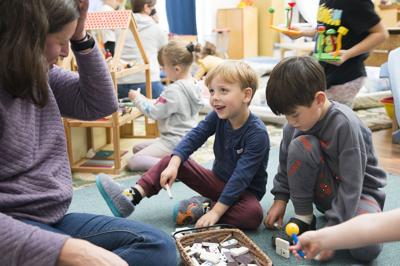BENNINGTON — Southwestern Vermont Health Care and the Community College of Vermont have joined forces to increase the number of highly trained early childhood educators working in daycare and early education centers across the state.
The hospital and the college are launching a program to help 18 students move more quickly through their CCV programs, graduate and join the child care workforce.
“In response to an urgent need for early childhood educators locally and statewide, SVHC is opting for a radical approach: pay CCV students to accelerate their own education so they can enter the workforce sooner,” said James Trimarchi, SVMC’s director of planning, in a news release announcing the program.
The need for quality daycare and early childhood educators is significant. At SVMC, the hospital’s daycare center, Learning Tree, currently has capacity for 69 children. SVHC received a federal earmark of $750,000 toward a roughly $4 million plan to expand the center to accept nearly double that number – a plan that is on hold given the financial challenge.
Providing additional child care availability would be a plus for the hospital in attracting new staff, said Trimarchi on Wednesday. “Our employees couldn’t take care of the patients they take care of unless they knew their kids were taken care of in a five-star facility,” he said.
“For our workforce, it is critical,” he said, noting that providing quality day care helps the hospital attract younger staffers, who then stay with SVMC for many years.
Like employers statewide and nationwide, SVHC would have trouble staffing an expanded early education/daycare center. There are students enrolled in community college early childhood education programs, but many are working two or even more jobs to make ends meet. That limits their course-load to one or two classes – slowing their progress toward the accreditation and certification to join or advance in the child care workforce.
To address that problem, Trimarchi said, SVHC used $62,000 of a $77,000 federal grant to provide $3,500 stipends to 18 students across Vermont – from Bennington to Brattleboro to Newport – enabling them to reduce work hours and increase their academic focus. The goal is to help students who would otherwise be forced to take five years to complete a certificate program to instead finish the program in two years.
The money was secured for the Early Childhood Education Residency Program by Vermont’s congressional delegation through the Health Resources and Services Administration. Residency students are enrolled in either CCV’s early childhood education associate degree or childcare certificate. Early childhood education is the largest degree program at the College, with more than 400 students enrolled in fall 2022, according to a release from CCV.
Six of the 18 students chosen for the program are from Bennington. Several already work in early education facilities, but others are new to the field and indicated an interest in serving their required 80-hour ‘precepting’ period — or hands-on training in a facility — at the hospital’s Learning Tree.
“Having more resources to get more schooling done makes me feel more confident that I could go for my bachelor’s after I get my associate, so I’m really thankful for that,” said Haley Harrington, who works at Learning Tree. After completing her associate degree, she plans to pursue a four-year degree.
This is a one-time program for SVMC, Trimarchi said. The funding has been allocated, and the facility is — after all — a hospital.
“It’s an extremely valuable program and it’s exciting,” Trimarchi said. “But we’re a health care institution.”
Still, he added, community colleges across the country have students struggling to complete programs in needed fields while working to support themselves.
“We have a labor force that is locked in community colleges that we could release,” he said. “I think this could be a national model.”


